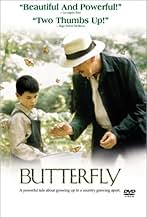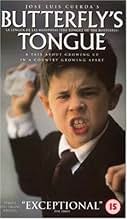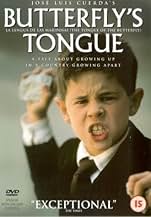NOTE IMDb
7,6/10
10 k
MA NOTE
Espagne, 1936. Moncho commence sa première année d'école au moment où la République espagnole est attaquée par les rebelles fascistes et son professeur considéré comme un ennemi du régime.Espagne, 1936. Moncho commence sa première année d'école au moment où la République espagnole est attaquée par les rebelles fascistes et son professeur considéré comme un ennemi du régime.Espagne, 1936. Moncho commence sa première année d'école au moment où la République espagnole est attaquée par les rebelles fascistes et son professeur considéré comme un ennemi du régime.
- Récompenses
- 6 victoires et 19 nominations au total
Elena Bagutta
- Carmiña
- (as Elena Fernández)
Roberto Vidal Bolaño
- Boal
- (as Roberto Vidal)
Antonio Lagares
- Alcalde
- (as Tucho Lagares)
Histoire
Le saviez-vous
- AnecdotesThe original Spanish title of the movie is "La lengua de las mariposas" which is translated into English as "The Tongue of the Butterflies" though it could also be translated as "The Language of Butterflies" too. The right way is the first meaning, because at a point of the movie Don Gregorio talks his classroom about butterflies, explaining how they have a coiled proboscis used for sucking the flowers nectar.
- Bandes originalesEn er mundo
Written by Juan Quintero (as Juan Quintero Muñoz) and Jesús Fernández Lorenzo
Commentaire à la une
I've been watching a lot of films in Spanish lately, trying to prepare for a course I will be teaching on Love in Hispanic Cinema. I'm searching for the film I can show that will exemplify love of country... and while I don't think this is the one I'm looking for, it may work insofar as the "love of Spain" expressed resonates with the same propagandistic tones similar expressions of "patriotism" so often do.
I won't bore you with the basics of plot nor repeat what everyone else has already said as you can read the intro and a hand-full of other posts and know enough. I will tell you that this is a subtle film. We in the US are so used to being hit over the head by our movies that watching this film is like feeling a soft breeze. It's oh so quietly disquieting.
I have found interesting the posts reviewing this film that criticize the "meanderings" of the plot --how far the dispersed elements take us away from the core message. But I ask, what is not childhood but a collection of fascinating and disconnected pieces of a puzzle that we can't put together quite yet. Music, love, family, sex, food, school, friends, women and girls, books, nature, teachers and grown men -all equally interesting and engaging to a young boy. But when he's all of maybe seven, what does he know about how they all relate to each other? What do any of us really know about how all the pieces of our lives fit together, or what they mean?
I especially enjoyed the sad quality of all the varied losses interwoven in the greater story; they tempered the otherwise hopeful mood of the film. The overall effect on me was that I understood that loss is comprised not only of one deep cut but of a thousand little ones too. It wasn't only the dream of a Republican and free Spain that was lost; it was much more that was lost as well.
The film-making here is exquisite too, like a butterfly, so beautiful visually; "La lengua de las mariposas" is so well executed that it truly feels real. There were no moments when I said to myself "oh, come on," as I do when I feel I've been taken for too stupid to figure things out for myself, when everything has been made too obvious, predigested for me by the movie makers.
Amazingly the child actor is believable at all times -never too precocious, never too coy. An excellent performance from a child actor is always a delight. See the Argentine film "Valentin" (2002) for another.
Others write that the ending is shocking, too abrupt and that the audience is neither prepared for it nor guided towards it. For me that is the perfect ending because it replicates the shock of the civil war to the Spaniards, and the shock adult violence inflicts upon childhood. For me, the abrupt ending was the radical interruption traditional Spain forced upon everyone's future. Never mind, as one post suggested that in Republican Spain the communists had taken over and democracy was no longer in effect. Democracy here is the exotic Chinese beauty Andrés falls in love with, a fantasy out of reach, silenced and taken hostage by a brute.
See this film and decide for yourself.
I won't bore you with the basics of plot nor repeat what everyone else has already said as you can read the intro and a hand-full of other posts and know enough. I will tell you that this is a subtle film. We in the US are so used to being hit over the head by our movies that watching this film is like feeling a soft breeze. It's oh so quietly disquieting.
I have found interesting the posts reviewing this film that criticize the "meanderings" of the plot --how far the dispersed elements take us away from the core message. But I ask, what is not childhood but a collection of fascinating and disconnected pieces of a puzzle that we can't put together quite yet. Music, love, family, sex, food, school, friends, women and girls, books, nature, teachers and grown men -all equally interesting and engaging to a young boy. But when he's all of maybe seven, what does he know about how they all relate to each other? What do any of us really know about how all the pieces of our lives fit together, or what they mean?
I especially enjoyed the sad quality of all the varied losses interwoven in the greater story; they tempered the otherwise hopeful mood of the film. The overall effect on me was that I understood that loss is comprised not only of one deep cut but of a thousand little ones too. It wasn't only the dream of a Republican and free Spain that was lost; it was much more that was lost as well.
The film-making here is exquisite too, like a butterfly, so beautiful visually; "La lengua de las mariposas" is so well executed that it truly feels real. There were no moments when I said to myself "oh, come on," as I do when I feel I've been taken for too stupid to figure things out for myself, when everything has been made too obvious, predigested for me by the movie makers.
Amazingly the child actor is believable at all times -never too precocious, never too coy. An excellent performance from a child actor is always a delight. See the Argentine film "Valentin" (2002) for another.
Others write that the ending is shocking, too abrupt and that the audience is neither prepared for it nor guided towards it. For me that is the perfect ending because it replicates the shock of the civil war to the Spaniards, and the shock adult violence inflicts upon childhood. For me, the abrupt ending was the radical interruption traditional Spain forced upon everyone's future. Never mind, as one post suggested that in Republican Spain the communists had taken over and democracy was no longer in effect. Democracy here is the exotic Chinese beauty Andrés falls in love with, a fantasy out of reach, silenced and taken hostage by a brute.
See this film and decide for yourself.
Meilleurs choix
Connectez-vous pour évaluer et suivre la liste de favoris afin de recevoir des recommandations personnalisées
- How long is Butterfly?Alimenté par Alexa
Détails
- Date de sortie
- Pays d’origine
- Site officiel
- Langues
- Aussi connu sous le nom de
- Butterfly
- Lieux de tournage
- Sociétés de production
- Voir plus de crédits d'entreprise sur IMDbPro
Box-office
- Montant brut aux États-Unis et au Canada
- 2 092 682 $US
- Montant brut mondial
- 7 738 129 $US
- Durée1 heure 36 minutes
- Couleur
- Mixage
- Rapport de forme
- 2.35 : 1
Contribuer à cette page
Suggérer une modification ou ajouter du contenu manquant

Lacune principale
By what name was La Langue des papillons (1999) officially released in India in English?
Répondre



























